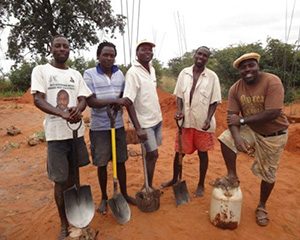Sustainable Change
 Strengthening the ability of the people to meet their own needs is an important part of our mission. Only change that is adopted by the people and adapted to meet their needs, using available resources, will continue beyond the life of this mission. Whether addressing physical or spiritual needs, our goal is to work alongside the people to develop ways they can provide for their families.
Strengthening the ability of the people to meet their own needs is an important part of our mission. Only change that is adopted by the people and adapted to meet their needs, using available resources, will continue beyond the life of this mission. Whether addressing physical or spiritual needs, our goal is to work alongside the people to develop ways they can provide for their families.
Sustainable Change
There is a big difference in providing goats for the villagers to eat, which will assuage their hunger for a few meals or giving them goats to breed and raise that will help them meet their dietary needs for years to come. The latter takes more work and education in animal husbandry but it will continue to benefit the community after the mission leaves.
In the same way, giving food in times of hunger meets a need temporarily but it will not meet the continuous need the way teaching new farming and gardening techniques will. We, at times, do see a need so dire that we are compelled by the love of Christ to meet that immediate need. But the goal of Pillar of Legacy is to help the people develop ways to meet their own needs.
For a new technique or method to become sustainable, it must take root in the community and be adapted to fit the culture and the conditions that exist there. When achieved, it establishes a new, accepted way of doing the necessary tasks of life. Learning, adapting, and accepting new ways to accomplish goals will often set the stage for the people to continue searching for more new, improved ways to take care of their families.
One of the success stories of the work POL has done in Chisuma which illustrates sustainability is the introduction of rocket stoves. The idea was introduced. The women adapted it to the materials they have on hand, improved the design to meet their needs and then shared the idea with others. This stove decreased the need for firewood while making it safer for everyone. Read more about Pillar of Legacy’s program with these stoves here in an article by Greg Williams, Facilitator for Sustainable Missions at Missions Resource Network.
The same principle of sustainability is true in planting churches. Our goal is to help establish an indigenous church that creates followers of Christ who worship him in their own language and consistent with their own way of life. The teachings of Christ are upheld but the customs are based on the native culture. In other words, the churches we plant are their churches, not ours, and their practices—within the bounds of Christianity—are theirs and not ours.The results of this have been obvious. In the times when our missionaries were away, the village church not only survived, but grew, as it will continue to when the missionaries move on to other locations to serve other people.
We are not here to be caregivers, but catalysts. Our role is not giving, but partnering, involving the people and using local resources. The legacy we want to leave is one of love, empowering the people to use their strengths and God-given talents not only to improve their lives, but—in Christ’s name—to improve the lives of others.
